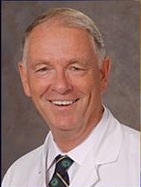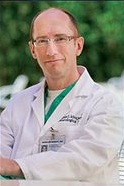SACRAMENTO, Calif. — A prominent neurosurgeon at the University of California, Davis, was banned from performing medical research on humans after he and a colleague were accused of experimenting on dying brain cancer patients without university permission.
Dr. J. Paul Muizelaar, who earns more than $800,000 a year as chairman of the university’s department of neurological surgery, was ordered last fall to “immediately cease and desist” from any research involving human subjects, according to documents obtained by The Sacramento Bee.
Also banned was Dr. Rudolph J. Schrot, an assistant professor and neurosurgeon who has worked under Muizelaar the past 13 years.
The university has admitted to the federal government that the surgeons’ actions amounted to “serious and continuing noncompliance” with federal regulations.
Documents show the surgeons obtained the consent of three terminally ill patients with malignant brain tumors to introduce bacteria into their open head wounds, under the theory that postoperative infections might prolong their lives. Two of the patients developed sepsis and died, the university later determined.
The actions – described by two prominent bioethicists as “astonishing” and a “major penalty” for the school – threaten both the doctors’ professional careers and the university’s reputation and federal-funding status.
“This is really distressing‚” said Patricia Backlar, an Oregon bioethicist who served on President Clinton’s national bioethics advisory commission.
“UC Davis is a very respectable school, but even the best places have trouble,” Backlar said. “These men have put that school in jeopardy.”
Research on both humans and animals is tightly controlled in the United States and, according to federal regulations and university policy, must undergo a rigorous approval process to ensure that subjects are protected.
Alleged violations involving experimental drugs or devices can trigger a “for-cause audit” by the U.S. Food and Drug Administration. Among possible enforcement actions, the agency can issue warning letters – and publicize them – or disqualify researchers from further clinical studies.The FDA has not notified UC Davis what, if any, action might be taken.
The National Institutes of Health also plays a role in protecting human subjects by potentially withholding coveted research money from individuals or institutions. Among medical schools, UC Davis ranks 36th in the nation in NIH funding for medical research at more than $130 million in 2011.
Muizelaar, 65, who has been a department chairman at the School of Medicine since 1997, said last week that he and Schrot believed the FDA gave its permission early on, if the doctors thought the treatment was “beneficial to the patients.” He described the research ban as an “overreaction” by the university.
“And I understand it,” he said. “There are people who blatantly break the rules that endanger all of their research programs. We certainly didn’t blatantly trample any rules.”
Schrot, 44, who was hired by Muizelaar, wrote in an email that “the determination of ‘serious and repeated noncompliance’ is misleading.”
Despite the disciplinary action imposed last fall, Muizelaar was honored this spring with an additional academic role at UC Davis. He was named the first holder of the Julian R. Youmans endowed chair in the department of neurological surgery, according to an April 19 news release from the university’s medical school.
He said he plans to funnel endowment dollars into further research on the procedure that led to the ban.
“If I come down with a glioblastoma, I will demand that it be done on myself,” Muizelaar said.
The divergent views illustrate the tension that exists at research institutions between protecting human subjects and developing cutting-edge cures.
After an inquiry from The Bee, the university agreed to release a full accounting of the internal probe into the doctors’ conduct.
UC Davis officials emphasized that they moved swiftly last year after learning more about the doctors’ unusual work, launching an internal investigation that lasted six months.
In October, documents show, the university’s vice chancellor for research notified the FDA of “serious and continuing noncompliance” by the two surgeons.
The letter from Harris A. Lewin, along with 195 pages of exhibits, claimed that Muizelaar and Schrot sidestepped procedures in their quest to introduce bacteria into live patients’ head wounds.
“We really take these matters very seriously,” Lewin said. “That‚’s why we self-reported” to the FDA.
An FDA spokeswoman said she could not comment on the UC Davis case, or whether it would trigger a federal audit.
“We pursued this very aggressively and very vigilantly to ensure that we were complying with all regulations, so that we can continue to put protection of human subjects as paramount,” Lewin said.
“You can understand why. Because if you don’t do so, all your funding for federal research can be in jeopardy.”
Lewin said physicians at UC Davis “have a lot of leeway” in treating patients – but not when it comes to using them in research.
Federal regulations require that any research involving human subjects be reviewed and monitored by an institutional review board, or IRB.
UC Davis has three IRB committees charged with protecting the rights and welfare of people involved in research studies. The campuswide committees, which include members from the general public, have the authority to approve, modify or reject all research activities that fall within their jurisdictions.
The IRBs are a formidable presence in any campus or research setting. Its members must ensure that research involving humans complies with all federal regulations and university policies, and that subjects are adequately protected.
Send questions/comments to the editors.




Success. Please wait for the page to reload. If the page does not reload within 5 seconds, please refresh the page.
Enter your email and password to access comments.
Hi, to comment on stories you must . This profile is in addition to your subscription and website login.
Already have a commenting profile? .
Invalid username/password.
Please check your email to confirm and complete your registration.
Only subscribers are eligible to post comments. Please subscribe or login first for digital access. Here’s why.
Use the form below to reset your password. When you've submitted your account email, we will send an email with a reset code.